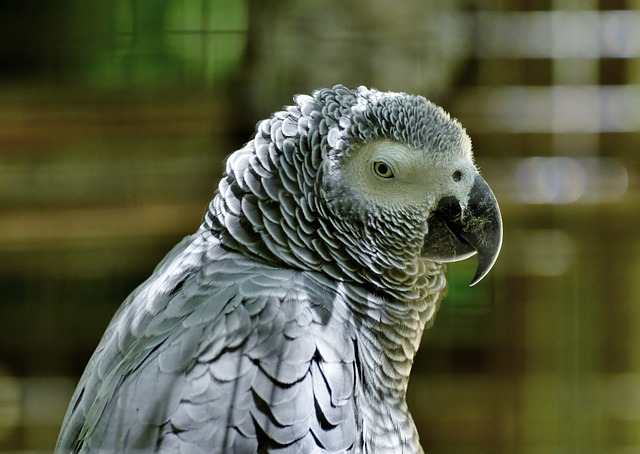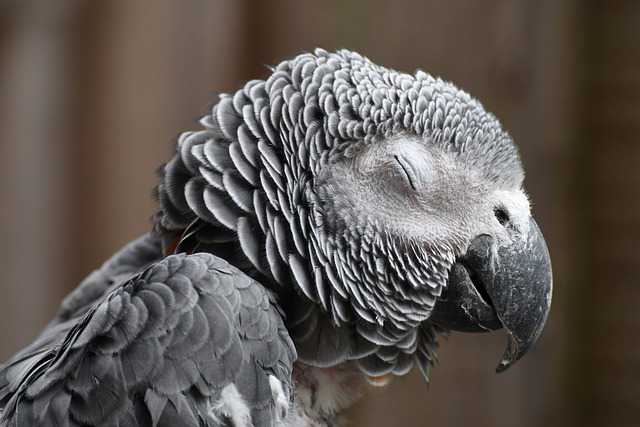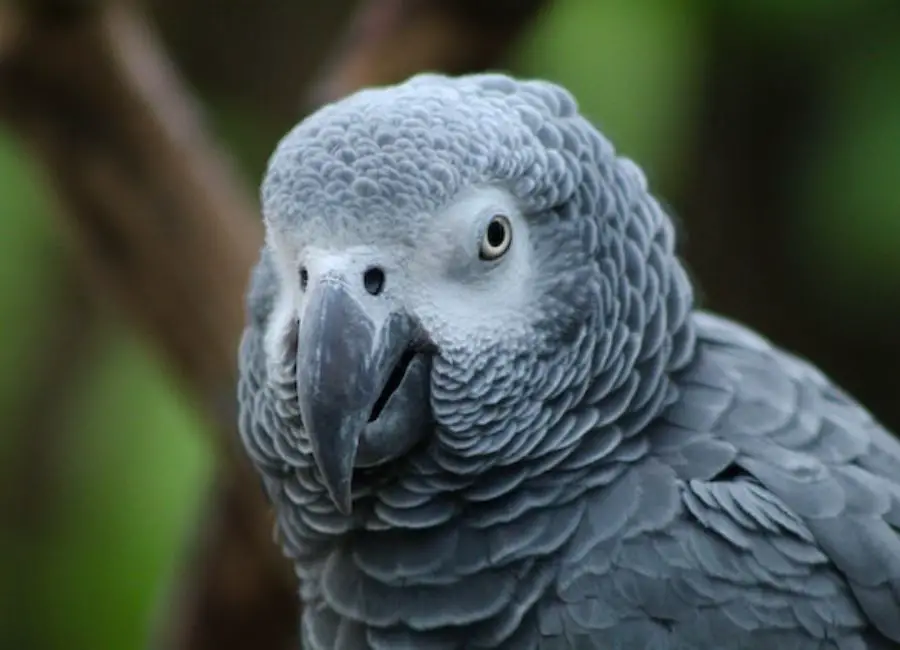Let’s discuss African grey liver disease symptoms you should know!
Are you a proud owner of an African Grey parrot? If so, then you know how intelligent and loving these birds can be. However, like all living creatures, they can fall victim to illness.
One common affliction among African Greys is liver disease, which can have serious repercussions for your feathered friend.
In this blog post, we’ll explore some of the telltale signs of liver disease in African Greys, so that you can get your pet the help they need if the worst should occur.
Causes of African Grey Liver Disease

African Grey liver disease is a condition that affects African Grey parrots and is primarily caused by a high-fat diet.
The excessive consumption of fatty foods, such as seeds and nuts, can lead to the accumulation of fat in the liver. This fat build-up can result in inflammation and damage to the liver cells.
Other factors that can contribute to African Grey’s liver disease include a lack of exercise, exposure to toxins, and certain genetic predispositions. Early detection and a balanced diet can help prevent and manage this disease in African Grey parrots.
African Grey Liver Disease Symptoms
African Grey Liver Disease is a condition that affects African Grey parrots and is characterized by liver dysfunction.
Symptoms of this disease may include weight loss, changes in appetite, and increased thirst.
It is important to seek veterinary care if you notice these symptoms in an African Grey parrot, as early diagnosis and treatment can improve the bird’s prognosis.
The following are some common African Grey liver disease symptoms:
1. Loss of Appetite
Loss of appetite in African grey parrots can be a symptom of African Grey Liver Disease. This disease affects the liver and can lead to a decrease in appetite.
To help, it is important to provide a balanced diet rich in fruits, vegetables, and high-quality pellets.
Additionally, ensuring a stress-free environment, regular vet check-ups and proper hygiene can aid in preventing and managing liver disease.
Consultation with an avian veterinarian is crucial for accurate diagnosis and appropriate treatment.
2. Changes in Droppings
Changes in droppings can be indicative of African Grey liver disease symptoms in African grey parrots.
These changes may include a decrease in urine production, an increase in urates (the white part of the droppings), and a change in the color or consistency of the feces.
To help with African Grey liver disease, it is essential to consult a veterinarian who specializes in avian medicine.
They can provide a proper diagnosis and recommend appropriate treatment, which may include dietary changes, supplements, and medication.
3. Lethargy
Lethargy in African grey parrots can be an indication of African Grey liver disease, a condition that affects their liver function.
Symptoms may include decreased activity levels, reduced appetite, and a general lack of energy. To help combat this, it is essential to provide a balanced and nutritious diet that supports liver health.
Regular veterinary check-ups and blood tests can help monitor liver function and detect any potential issues early on.
Additionally, ensuring a clean and stress-free environment, along with regular exercise and mental stimulation, can promote overall well-being in African grey parrots.
4. Yellowing of Skin and Eyes
Yellowing of the skin and eyes in African grey parrots can be indicative of a condition known as African Grey Liver Disease.
This disease affects the liver and can lead to the accumulation of bile pigments, resulting in the yellowing of these areas.
If you notice these symptoms in your parrot, it is essential to seek veterinary attention promptly. The veterinarian may recommend diagnostic tests, such as blood work and imaging, to confirm the diagnosis.
Treatment options may include dietary changes, medication, and supportive care to help manage the liver disease and improve the parrot’s overall health.
5. Swollen Abdomen
Swollen abdomen in African grey parrots can be a symptom of African Grey liver disease. This condition is characterized by the accumulation of fluid in the abdominal cavity.
To help alleviate the symptoms, it is important to consult a veterinarian specializing in avian medicine. They may recommend diagnostic tests such as blood work, ultrasound, or radiographs to determine the underlying cause.
Treatment options may include dietary changes, medication, or surgical intervention, depending on the severity and cause of the condition. Early detection and prompt veterinary care are crucial for the well-being of the parrot.
6. Weight Loss
Weight loss in African grey parrots can be an indication of African Grey Liver Disease (AGLD). AGLD is a condition that affects the liver, leading to weight loss and other symptoms.
To help with AGLD, it is crucial to consult an avian veterinarian who can provide a proper diagnosis and treatment plan. They may recommend dietary changes, such as a low-fat, high-fiber diet, to support liver function.
Additionally, providing a stress-free environment and regular exercise can contribute to the overall well-being of the parrot.
Monitoring weight and observing any changes in behavior or appetite is essential for early detection and intervention.
7. Difficulty Breathing
Difficulty breathing in African grey parrots can be a symptom of African Grey liver disease. This disease is caused by a build-up of fat in the liver, leading to liver dysfunction.
To help alleviate this condition, it is crucial to provide a balanced diet that includes fresh fruits, vegetables, and a limited amount of high-quality pellets.
Regular exercise and mental stimulation should also be incorporated into the parrot’s daily routine. Additionally, it is essential to consult with an avian veterinarian for proper diagnosis and treatment options.
8. Wet droppings and Diarrhea
Wet droppings and diarrhea in African grey parrots can be symptoms of African Grey liver disease. This disease affects the liver’s ability to properly metabolize fats, leading to digestive issues.
To help alleviate these symptoms, it is important to ensure the parrot’s diet is balanced and includes essential nutrients. Additionally, providing clean and fresh water, as well as regular exercise, can aid in maintaining a healthy digestive system.
Consulting with a veterinarian who specializes in avian medicine is crucial for the proper diagnosis and treatment of African Grey Liver Disease.
9. Jaundice
Jaundice in African grey parrots can be a symptom of African Grey liver disease. This condition affects the liver’s ability to function properly, leading to a buildup of bilirubin in the bloodstream.
Signs of jaundice in African grey parrots include yellowing of the skin, eyes, and beak. To help, it is crucial to consult with an avian veterinarian for a proper diagnosis and treatment plan.
Treatment may involve dietary changes, medication, and supportive care to improve liver function and reduce bilirubin levels. Regular veterinary check-ups and a healthy, balanced diet can also aid in preventing liver diseases in African grey parrots.
10. Loss of balance
Loss of balance in African grey parrots can be a symptom of African Grey liver disease. This disease affects the liver and can cause a variety of symptoms, including neurological issues like loss of balance.
To help a parrot experiencing this symptom, it’s important to consult with a veterinarian who specializes in avian medicine. They can perform diagnostic tests to confirm the liver disease and develop a treatment plan.
Treatment may involve dietary changes, medication, and supportive care to alleviate symptoms and improve the bird’s overall health and balance.
Treatment Options for African Grey Liver Disease

Treatment options for African Grey liver disease may vary depending on the specific diagnosis and severity of the condition, which include:
Dietary Changes: A proper diet is crucial for the overall health of African Grey parrots and can play a role in managing liver disease. Your veterinarian may recommend a specialized diet that is low in fat and high in essential nutrients. This may include a variety of fresh fruits, vegetables, and high-quality pelleted bird food.
Medication: Medications may be prescribed to address specific symptoms or underlying causes of liver disease. For example, if the liver disease is caused by a bacterial infection, antibiotics may be prescribed. Other medications, such as antioxidants or liver-supportive supplements, may also be recommended to help support liver function.
Surgery: In some cases, surgery may be necessary to address certain liver conditions in African Grey parrots. This may involve removing tumors, treating liver abscesses, or repairing structural abnormalities in the liver.
Supportive Care: In addition to specific treatments, providing supportive care is important for the well-being of African Grey parrots with liver disease. This may include maintaining a clean and stress-free environment, ensuring proper hydration, and offering appropriate pain management if necessary.
It is crucial to consult with a qualified avian veterinarian for an accurate diagnosis and appropriate treatment plan for African Grey liver disease.
They will be able to assess the specific condition and recommend the most suitable treatment options for your parrot.
Early detection and intervention can greatly improve the chances of successful treatment and management of liver disease in African Grey parrots.
Learn more about identifying a sick African grey parrot.
FAQs
What is African Grey Liver Disease?
African Grey Liver Disease, also known as hepatic lipidosis or fatty liver disease, is a condition that occurs when excess fat is deposited in the liver cells of African Grey parrots. This can lead to a range of symptoms, including weight loss, lethargy, and decreased appetite. In severe cases, liver disease can be fatal.
How is African Grey Liver Disease diagnosed?
African Grey Liver Disease is typically diagnosed through a combination of physical examination, blood tests, and imaging studies such as X-rays or ultrasounds. Your veterinarian may also perform a liver biopsy to confirm the diagnosis and determine the extent of the damage.
Can African Grey Liver Disease be treated?
Yes, there are several treatment options available for African Grey Liver Disease, including changes to the bird’s diet and exercise routine, medications to support liver function, and, in severe cases, surgical intervention. It is important to work closely with a qualified avian veterinarian to determine the best course of treatment for your bird.
How can African Grey Liver Disease be prevented?
The best way to prevent African Grey Liver Disease is to provide your bird with a healthy diet that is low in fat and high in nutrients. Additionally, regular exercise and stress reduction techniques such as environmental enrichment can help reduce the risk of liver disease. It is also important to schedule regular check-ups with your avian veterinarian to monitor your bird’s health and catch any potential health issues early on.
Conclusion
In conclusion, if you are a proud owner of an African Grey parrot, it is important to be aware of the symptoms of liver disease. Early detection and proper treatment can make all the difference in ensuring the health and well-being of your feathered friend.
So, keep an eye out for any unusual behaviors or changes in your parrot’s appearance, and consult a veterinarian if you have any concerns. With love and proper care, your African Grey can live a long and happy life by your side.

